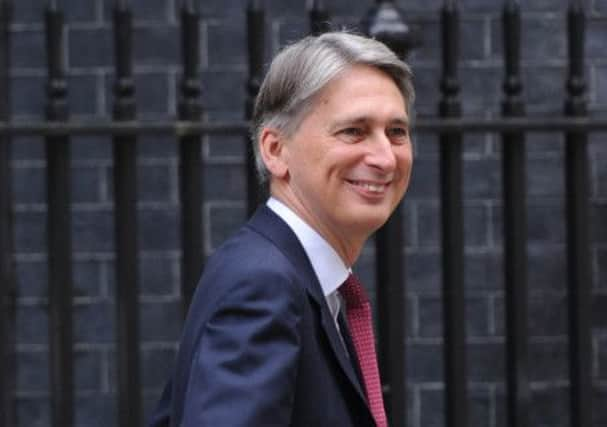TA soldiers to get pensions and benefits


Soldiers who have been made redundant in the recent rounds of Ministry of Defence cuts are being offered £5,000 to sign up as reservists.
The measures are part of a £1.8 billion reorganisation of the reserve forces which will see 38 Territorial Army centres shut down, seven of them in Scotland.
Advertisement
Hide AdAdvertisement
Hide AdThe government aims to drive up the number of reservists in the army from 20,000 to 30,000 and has offered the new package of benefits to attract recruits as it restructures the armed forces.
The size of the regular army is being cut from 102,000 to 82,000, with the new Army Reserve – replacing the TA – making up the shortfall with a much enhanced role.
Among the other benefits being offered include privileged access to employment tribunals for anyone who loses their job as a result of being a reservist.
From April 2015, reservists will be able to accrue armed forces pensions while training, as well as when deployed, and will have access to healthcare benefits similar to those given to serving soldiers.
Defence Secretary Philip Hammond said: “We recognise the extraordinary commitment reservists make and, in return, we commit to deliver the reservists a challenging and rewarding experience, combined with an enhanced remuneration and support package and an improved deal for employers.
“The job we are asking our reservists to do is changing. The way we organise and train them will also have to change.”
The head of the army in Scotland, Major General Nick Eeles, yesterday claimed the defence white paper was a “good deal” for Scotland.
Although seven TA bases would be closed, Maj Gen Eeles said they had few staff and some of the closures would be offset by expansion elsewhere.
Advertisement
Hide AdAdvertisement
Hide AdHe pointed out that Scotland’s TA strength currently stood at 2,286 – some way short of the funded places. Therefore, there would need to be better recruitment in order to fill the 3,700 funded places by 2018.
He said: “I would argue [this] represents a good deal for the army in Scotland. Put another way, over 12 per cent of the UK’s Army Reserve and 15 per cent of its Army Reserve centres will be based in Scotland, delivered by 8.3 per cent of the UK’s population,” Maj Gen Eeles said.
“With this greater representation comes responsibility – we must recruit and retain 3,700 Reserve soldiers into the units that are based in Scotland – a significant challenge when compared to the current TA strength here.
“We should not underestimate the scale of the challenge, but with the measures announced in the White Paper today targeting reservists, families and employers, the requisite uplift can be achieved.”
The bases to be closed are in Wick, Dunoon, Keith, Kirkcaldy. In Dunfermline, Glasgow and Edinburgh three smaller sites will close, but these will be balanced by increases in other parts of these towns and cities.
The closures will also be off set by a new base in Kilmarnock for 6 SCOTS.
Conservative MP Colonel Bob Stewart warned: “Over the last year, recruitment to the Territorial Army, and now the Reserves, has not been great and so I am slightly pessimistic.”
Tim Ripley: Philip Hammond struggles towards battle plan of sorts
Advertisement
Hide AdAdvertisement
Hide AdAMID Philip Hammond’s announcement on the future of the reserve forces yesterday it was possible – just – to discern a strategy of sorts.
The defence secretary is pushing ahead with controversial plans unveiled in the 2010 strategic defence and security review to fill gaps left by reductions in the regular army with “weekend warriors”.
Large parts of the future army will only be able to be sent to war – or even sent on major training exercises – by the calling up of reservists.
Each reserve unit is now to be partnered with a regular counterpart or a regular brigade headquarters, so the whole will not be able function without both reserve and regular components operating together. This is the key to allowing the army to meet its demanding target to save billions of pounds by making 20,000 regulars redundant.
This makes the regular reliant on its reserve component in a way that it has never been before.
Recruitment to the soon-to-be-renamed Territorial Army has stagnated over the past five years, with only some 19,000 members of the 35,000 strong organisation regularly turning up for duty.
Mr Hammond is trying to address this issue by improving what he termed, the “army reserve offering”, including increasing the pay of reservists, providing compensation to employers who let their staff serve with the reserves and improving employment protection legislation. In times of austerity, this will be a challenge as individual reservists and their employers look at the real costs of reserve service.
For Scotland, the changes to the army reserves have hit two main units hard – 7th Battalion, The Royal Regiment of Scotland, and 71 Engineer Regiment – which both see the loss of company sized units as part of the net closure of six training centres in Scotland. The need to align these regiments with their “partner” in the regular army and alleged poor recruiting have all driven these cuts.
Advertisement
Hide AdAdvertisement
Hide AdWhile the return from Germany of the Royal Scots Dragoon Guards to the RAF Leuchars has created a need for a partner armoured corps reserve unit, leading to the relocation of a yeomanry regimental headquarters to Edinburgh. A new medical squadron is also being set up in Stirling. So Scotland seems to have got off lightly in the army top brass’ reshuffle exercise.
How Scotland’s reserve soldiers and their employers react to these changes will be the true test of whether they endure and provide more combat power for the army.
• Tim Ripley is a defence analyst and commentator